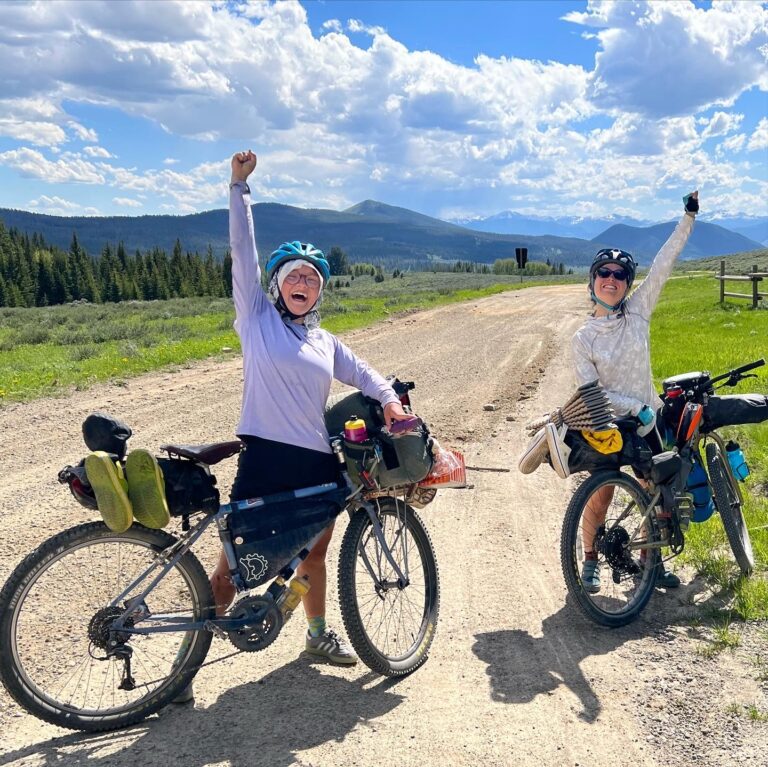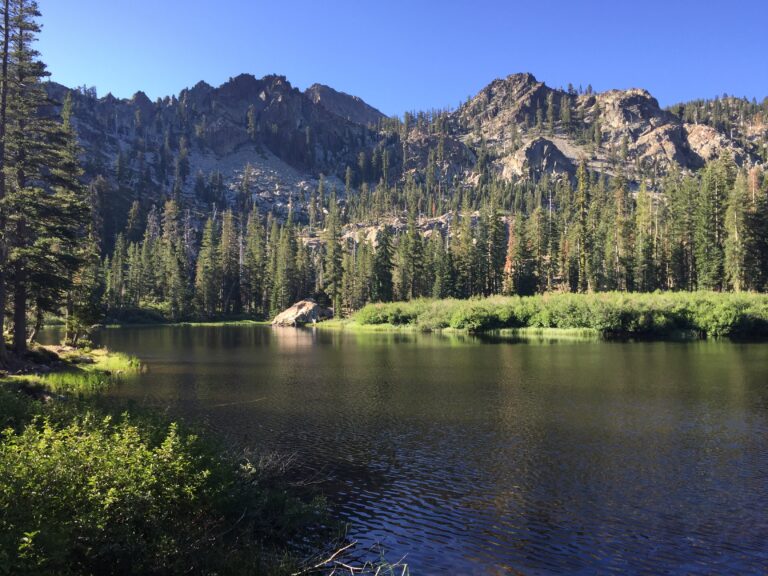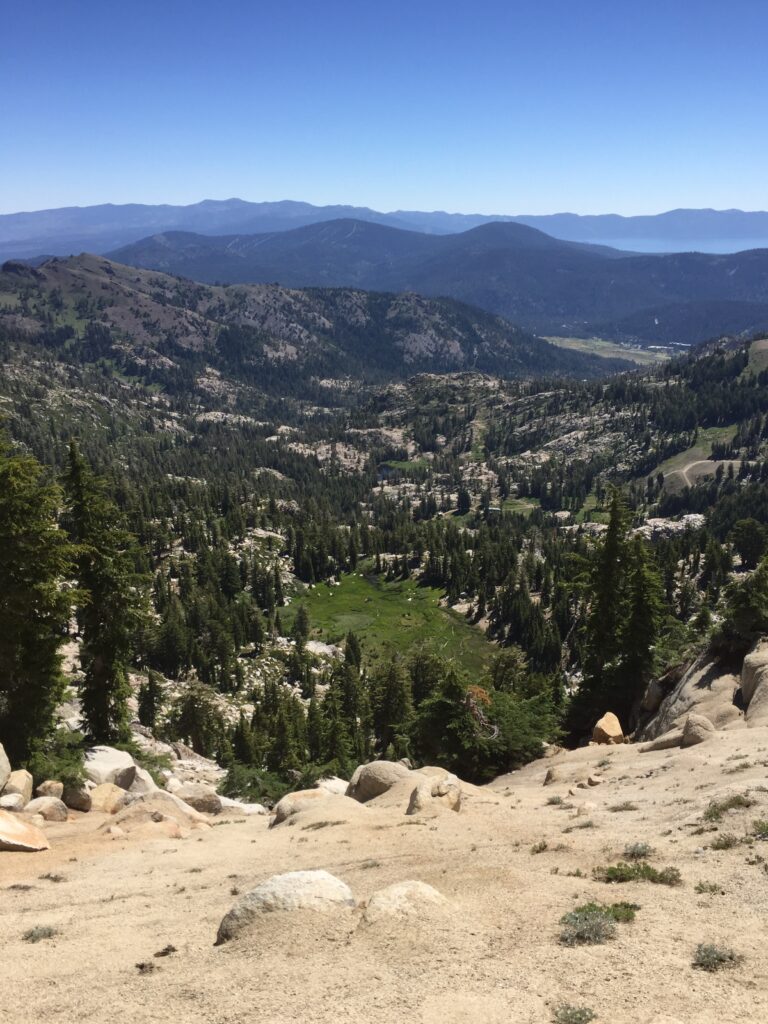Those looking to discover adventure, get out of their cars and do something about climate change could learn a thing or two from San Francisco’s Dasha Yurkevich and Zora Kramer.
The two 20-year-old college students rode their bikes through five states along the Continental Divide this summer. In about 40 days, the pair pedaled 1,777 miles and climbed 120,000 feet in the Rocky Mountains.
“We rode on single track, two track, rail trails, fire roads, pushed our bikes up mountain passes, rode highways and backroads. We rode over mountains and through river valleys, meadows, deserts, lakes and towns. We got rained on, hailed on, beaten on by relentless winds, attacked by bugs, and left in clouds of dust by ATVs,” recalled Yurkevich. “We cried, sweat, bled, and laughed. We rode the Continental Divide.”
In the process, the two did more than bike from Canada to Mexico. They sent a message and set an example about using sustainable transportation. They relied on their bicycles and public transit even to reach the ride’s start in Whitefish, Montana and return from its finish in Santa Fe, New Mexico.
“Climate justice, in my eyes, means not relying on cars to help us travel and achieve our goal,” said Yurkevich. “Traveling by bike is my favorite way to travel and I hope that by sharing the stories of our journey I can inspire others to give it a try.”
The cyclists plan to keep their wheels spinning, aiming to teach more young people about bike touring and take an encore ride in 2023. Learn more at instagram.com/youthbikeamerica.
2022 saw the pandemic recede, wildfires decrease and outdoor recreation dramatically improve as a result. Here are some other positive outdoor stories you may have missed.
California opened the door to increased outdoor opportunities by committing $57 million for underprivileged people in 125 communities. The Outdoor Access for All initiative will fund access to nature, outdoor leadership education and career pathways. Thousands of people will experience hiking, camping, kayaking, snowboarding and more as a result. “These programs will turn parks into outdoor classrooms, inspiring a new generation of environmental leadership in California,” said California State Parks Director Armando Quintero.
Improvement projects
Grove of the Titans, in Jedediah Smith Redwoods State Park of Del Norte County and within Tolowa Dee-ni’ Nation ancestral territories, reopened to hikers following a $4 million facelift. Largely unknown before this century, the grove featuring some of the world’s largest redwoods attracted increasing numbers of hikers who damaged the ecosystem in the last 20 years. Stakeholders collaborated to improve parking, build restrooms, remove social trails, realign Mill Creek Trail and build a 1,300-foot boardwalk to protect the trees’ roots.
Trailblazers labored on the Lost Sierra Route, a new multi-use path that could eventually cover 600 miles in six Northern Sierra counties. Planners from Sierra Buttes Trail Stewardship hope the trail will attract visitors and tourism to the economically struggling region. This year, the group worked on a 20-mile segment between Quincy and Taylorsville. Supporters hope to connect 15 communities from Truckee to Susanville. Discover more at sierratrails.org.
And scuba divers completed an unprecedented project to remove underwater trash from Lake Tahoe, lifting more than 24 tons from the 72-mile shoreline over 81 days. “We have taken action locally and not only have we removed litter but we have inspired others to act globally,” reflected Colin West, founder of the nonprofit Clean Up The Lake. The group is following up with similar efforts at Donner Lake, Fallen Leaf Lake and June Lake. Find out more at cleanupthelake.org.
Map makeover, revisited
A years-long effort to change offensive place names made more progress in 2022. Eighty geographic features on federal land in California, 34 in Nevada and more than 650 nationwide have changed to remove a slur demeaning Indigenous women.
Secretary of the Interior Deb Haaland declared the word squaw derogatory and ordered the term replaced on federal territory. That effort concluded in September with the announcement of new names, like Olympic Valley and Washeshu Peak in the Lake Tahoe area.
“Words matter, particularly in our work to make our nation’s public lands and waters accessible and welcoming to people of all backgrounds. Consideration of these replacements is a big step forward in our efforts to remove derogatory terms,” said Haaland.
California followed suit as Gov. Newsom signed a law to remove the word from nearly 100 names of peaks, valleys, bodies of water and even towns within three years.
In addition, California State Park and Recreation Commission changed the name of an area within Folsom Lake State Recreation Area to Black Miners Bar, at least temporarily. Negro Bar, the previous name connected to Gold Rush-era Black miners there, drew criticism for decades. The commission plans to designate a permanent name in 2023.
Pacific Crest Trail exploits
British hiker Josh Perry set an amazing record on the Pacific Crest Trail, covering the entire 2,650-mile route without support in 55 days, 16 hours and 54 minutes. Running an average of 48 miles per day, he raced in self-supported fashion, meaning he used no support team. Although a fire-related trail closure in Oregon forced Perry to take a slower cross country detour, he broke the previous self-supported record by more than five days. He has spoken openly about the physical and mental health challenges he had to overcome.
“This has been a goal years in the making, and a dream of mine since I first heard of thru hiking after reading about Heather Anderson’s record-setting hike in 2013,” recounted Perry, 27. “At the end of the day, the experience I had was an incredible one.”
Then on the opposite end of the PCT spectrum are hikers like yours truly. I continued my incremental approach to the national scenic trail which I started 25 years ago. I’ve trekked bit by bit since then until this year I got more serious. My push from Lassen Volcanic National Park to Rainy Pass in Washington took 77 days and covered some 1,300 miles, by far the longest walk of my life. I loved everything about it: exploring new places, climbing summits on the way, hiking with old friends and making new ones from all over the world. In 2023, I intend to hike the rest.
Finally, if you’re looking for a good read or a holiday gift, pick up “Crossing Paths: A Pacific Crest Trailside Reader,” a compilation of stories from dozens of contributors, edited by Rees Hughes and Howard Shapiro. “Love. Happiness. Humor. Hardship. Daring. Fear. Racism. Rescue. Music. Passion. Peace. They are all here, in these pages, in deeply personal accounts. That’s what the trail is really all about,” wrote Liz Bergeron, executive director of Pacific Crest Trail Association.





